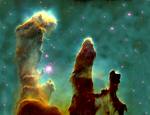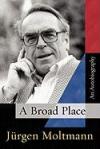
I have been reading William Dyrness’ book The Earth is God’s, and the further i read the more unsettled i become about the word “creation.” Not so much God’s act per se, but more what we mean when trying to describe what exactly makes up the content of that act of the Triune God. For example, at one point Dyrness writes, in relation to the new heavens and new earth, that
This event is clearly the end toward which creation moves and represents the fulfillment of all God’s purposes with reference to creation (56).
First of all, despite Paul’s use of this type of personifying language about creation, i am a bit dumbfounded in general by describing creation in this way. Surely Paul had a more nuanced idea in mind that was lost in translation. How does creation “move” or “groan?” Obviously Paul is being metaphorical, but this had to be anchored in a more concrete reality or understanding, right? When i read books like Dyrness, i have the intuition that such language is used much more loosely than Paul’s.
My last two criticisms relate to this point: The use of the word seems so broad as to ultimately mean nothing. The good, the bad, and the ugly of nature are often unwittingly lumped into one big term, “creation,” when they obviously have distinct theological significance.
For example, is all of creation is moving toward this end? Natural disasters comprise a part of this march toward a new heaven and a new earth? Seems unlikely; rather, these are radical departures from God’s ideal for creation, the effects of sin.
Related to this, how can we when observing creation say that in light of all the horrors that creation can birth that it is “clearly moving towards” a new heaven and new earth? Obviously revelation is key here, but again such a broad word seems to obsfucate rather than clarify, especially since such horrors are often more difficult to spot than a hurricane hitting a coastline.
I am not trying to unfairly pick on Dyrness here. I can attest that he does affirm the reality of sin in creation (though not as strongly as he should i think). That said, can one really untangle sin from creation to the point where they can confidently affirm, like God did before the fall, what is “good?” I am not sure we always can, and it seems like instead we simply use a generic word, “creation,” for everything, implictly affirming the fallen asepcts as “good” when they are not. My basic concern is that the word “creation” can be too broad, bland, and vague, becoming open to misinterpretation. Further, such a vague category can be intentionally nebulous, allowing a thinker to become (to use John Sanders’ phrase) “a moving target” and thus hard to critique.
So, i guess my question is: can we think of a better word, one that makes better distinctions of the complex realities i mentioned above, and one that doesn’t make for such easy equivocation?









